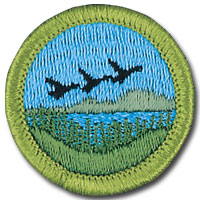The BSA Fish & Wildlife Management merit badge. (Photo | BSA meritbadge.org)
The idea behind North American wildlife management is a pretty nifty concept. I mean, who wouldn’t want to support concepts that promote conservation and bolster biodiversity across America’s wildlife landscape?
In essence, the mission behind the concept is clear - attempting to balance the needs of wildlife with the needs of people. Using the best available science, the concept of wildlife management draws from a myriad of different disciplines to gain insight that delivers the best possible outcome. It includes parallels such as the keeping and maintaining of wild game, wildlife conservation and even attributes of pest control.
It includes biologists, mathematicians, geologists and others in the science field working closely with licensed hunters, anglers and trappers to help manage and conserve fish and wildlife species in a regulated fashion.
Despite criticism by animal rights activists over the managed control of wildlife populations through regulated take and seasonal hunting, the concept of wildlife management has proven successful throughout North America.
The Boy Scouts of America would tend to agree - with the ability for enrolled scouts to earn the “Fish and Wildlife Management” merit badge.
The Wildlife Management badge, created in 1952 and replaced 20 years later by the Fish and Wildlife Management badge, requires scouts to describe the meaning and purposes behind fish and wildlife conservation and management, discuss problems that continue to threaten wildlife resources, and list major fish and wildlife management practices used by managers.
The badge also requires scouts to learn about the different positions held by fisheries and/or wildlife professionals, and research the education and training requirements for those positions.
BSA says,
Wildlife management is the science and art of managing the wildlife—both animals and fish—with which we share our planet. Maintaining the proper balance and the dynamics that go with it requires humankind's attention. We use this stewardship tool to help minimize or eradicate the possibility of extinction of any given species. We want our descendants to have the opportunity to experience the same animal diversity that we now enjoy.
Actions required for the badge include the construction and periodic checking of bird feeders and/or artificial nest boxes, along with keeping written records for a full nesting season. It also requires the implementation of a fishery improvement project or backyard wildlife habitat improvement project.
It takes a page from the life of John James Audubon, by requiring the design and construction of a wildlife blind near a game trail, water hole, salt lick, bird feeder, or birdbath and take photographs or make sketches from the blind of wild birds, mammals, reptiles, or amphibians.
The BSA merit badge pamphlet. (Photo | Boy Scouts of America)
The BSA has a long history with conservation and wildlife management endeavors. One of the organization’s rarest and most prestigious awards, The Hornaday Award, is named after hunter and taxidermist William T. Hornaday.
While Hornaday himself was a staunch critic of the unregulated market hunting of the late 1800’s, he did in fact hunt species to acquire research specimens, and paved the way for future conservation endeavors by big ticket names such as Teddy Roosevelt and wildlife management pioneer Aldo Leopold.
The Hornaday Award has multiple tiers, such as badge, bronze medal, silver medal, gold badge and gold medal. Scouts who have reached “First Class Rank” can earn any of the first three tiers. Gold badge and gold medal tiers are designated for adults nominated after years of environmental service.
Other Scout merit badges in similar fields include Bird Study, Environmental Science, Forestry, Geology, Insect Study, Mammal Study, Nature, Oceanography, Plant Science, Reptile and Amphibian Study, Soil and Water Conservation, and the Sustainability badge.
Other awards include the Conservation Good Turn Award, Outdoor Ethics Awareness Award, Outdoor Ethics Action Award, National Outdoor Badge for Conservation, and the World Conservation Award.
Just another shining example of citizens supporting the wildlife management endeavors we try to promote here at Furbearer Conservation headquarters!
Support our youth in the outdoors - learn more about Scouting endeavors at the BSA website.


